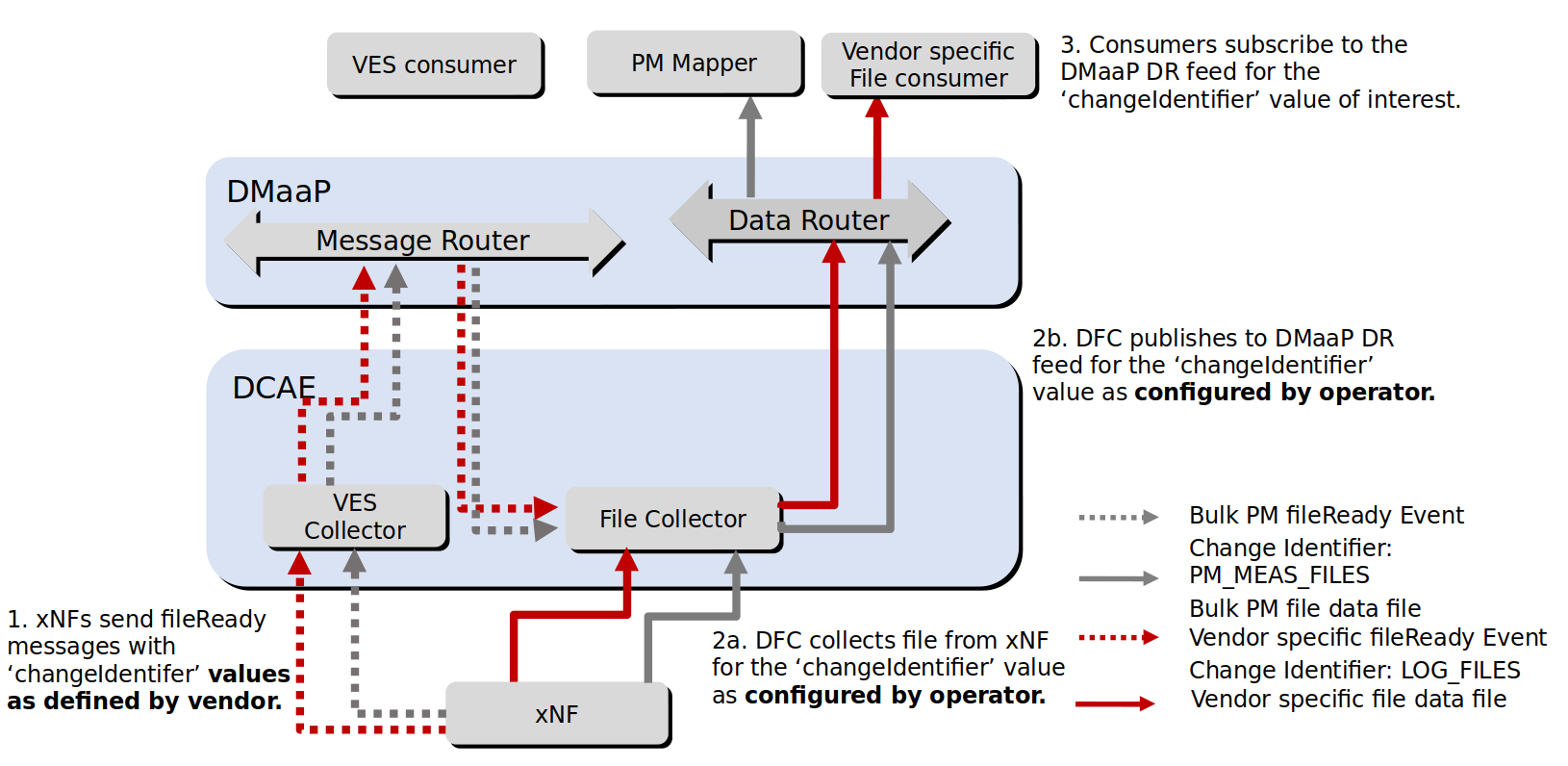Configuration and Performance
The DataFile Collector (DFC) gets fileReady messages from the Message Router (MR) sent from xNFs, via the VES Collector. These messages contains data about files ready to get from the xNF. DFC then collects these files from the xNF and publishes them to the DataRouter (DR) on a feed. Consumers can subscribe to the feed from DR and process the file for its specific purpose. The connection between a file type and the feed it will be published to is the changeIdentifier. DFC can handle multiple changeIdentifier/feed combinations, see picture below.

Configuration
By default, DFC handles the “PM_MEAS_FILES” change identifier and publishes these files on the “bulk_pm_feed” feed. But it can also be configured to handle more/other change identifiers and publish them to more/other feeds. The configuration of DFC is controlled via a blueprint.
The user can also specify which version of DFC to use.
image: onap/org.onap.dcaegen2.collectors.datafile.datafile-app-server:1.9.0
The user can also enable secure communication with the DMaaP Message Router.
dmaap.security.enableDmaapCertAuth: true
DFC can handle multiple stream identifiers. For each stream identifier/feed combination the user must provide the ** stream identifier**, feed name, and feed location.
Note! The feed name provided should be used by the consumer/s to set up the subscription to the feed.
The stream identifier shall be defined as an item under the streams_publishes tag in the “applicationConfig” section.
:emphasize-lines: 2,6
applicationConfig:
streams_publishes:
PM_MEAS_FILES:
dmaap_info:
publisher_id: ${DR_FILES_PUBLISHER_ID_0}
location: loc00
log_url: ${DR_LOG_URL_0}
publish_url: ${DR_FILES_PUBLISHER_URL_0}
username: ${DR_USERNAME}
password: ${DR_PASSWORD}
type: data_router
streams_subscribes:
dmaap_subscriber:
dmaap_info:
topic_url: "http://message-router:3904/events/unauthenticated.VES_NOTIFICATION_OUTPUT"
type: message_router
Under this tag the internal “feed identifier” for the feed shall also be added to get the info about the feed substituted in by CBS (that’s what the <<>> tags are for).
The feed name and feed location are defined as inputs for the user to provide in helm chart values.yaml. An example snapshot on default configuration is provided below.
# DataRouter Feed Configuration
drFeedConfig:
- feedName: bulk_pm_feed
owner: dcaecm
feedVersion: "0.0"
asprClassification: unclassified
feedDescription: DFC Feed Creation
# DataRouter Publisher Configuration
drPubConfig:
- feedName: bulk_pm_feed
username: ${DR_USERNAME}
userpwd: ${DR_PASSWORD}
dcaeLocationName: loc00
Turn On/Off StrictHostChecking
StrictHostChecking is a SSH connection option which prevents Man in the Middle (MitM) attacks. If it is enabled, client checks HostName and public key provided by server and compares it with keys stored locally. Only if matching entry is found, SSH connection can be established. By default in DataFile Collector this option is enabled (true) and requires to provide known_hosts list to DFC container.
Important: DFC requires public keys in sha-rsa KeyAlgorithm
Known_hosts file is a list in following format:
<HostName/HostIP> <KeyAlgorithms> <Public Key>
e.g:
172.17.0.3 ssh-rsa AAAAB3NzaC1yc2EAAAADAQABAAACAQDRibxPenQC//2hzTuscdQDUA7P3gB9k4E8IgwCJxZM8YrJ2vqHomN8boByubebvo0L8+DWqzAtjy0nvgzsoEme9Y3lLWZ/2g9stlsOurwm+nFmWn/RPnwjqsAGNQjukV8C9D82rPMOYRES6qSGactFw4i8ZWLH8pmuJ3js1jb91HSlwr4zbZZd2XPKHk3nudyh8/Mwf3rndCU5FSnzjpBo55m48nsl2M1Tb6Xj1R0jQc5LWN0fsbrm5m+szsk4ccgHw6Vj9dr0Jh4EaIpNwA68k4LzrWb/N20bW8NzUsyDSQK8oEo1dvsiw8G9/AogBjQu9N4bqKWcrk5DOLCZHiCTSbbvdMWAMHXBdxEt9GZ0V53Fzwm8fI2EmIHdLhI4BWKZajumsfHRnd6UUxxna9ySt6qxVYZTyrPvfOFR3hRxVaxHL3EXplGeHT8fnoj+viai+TeSDdjMNwqU4MrngzrNKNLBHIl705uASpHUaRYQxUfWw/zgKeYlIbH+aGgE+4Q1vnh10Y35pATePRZgBIu+h2KsYBAtrP88LqW562OQ6T7VkfoAYwOjx9WV3/y5qonsStPhhzmJHDF22oBh5E5tZQxRcIlQF+5kHmXnFRUZtWshFnQATBh3yhOzJbh66CXn7aPj5Kl8TuuSN48zuI2lulVVqcv7GmTS0tWNpbxpzw==
HostName could also be hashed, e.g:
|1|FwSOxXYeJyZMAQM3jREjLSIcxRw=|o/b+CHEeHuED7WZS6sb3Y1IyHjk= ssh-rsa AAAAB3NzaC1yc2EAAAADAQABAAACAQDRibxPenQC//2hzTuscdQDUA7P3gB9k4E8IgwCJxZM8YrJ2vqHomN8boByubebvo0L8+DWqzAtjy0nvgzsoEme9Y3lLWZ/2g9stlsOurwm+nFmWn/RPnwjqsAGNQjukV8C9D82rPMOYRES6qSGactFw4i8ZWLH8pmuJ3js1jb91HSlwr4zbZZd2XPKHk3nudyh8/Mwf3rndCU5FSnzjpBo55m48nsl2M1Tb6Xj1R0jQc5LWN0fsbrm5m+szsk4ccgHw6Vj9dr0Jh4EaIpNwA68k4LzrWb/N20bW8NzUsyDSQK8oEo1dvsiw8G9/AogBjQu9N4bqKWcrk5DOLCZHiCTSbbvdMWAMHXBdxEt9GZ0V53Fzwm8fI2EmIHdLhI4BWKZajumsfHRnd6UUxxna9ySt6qxVYZTyrPvfOFR3hRxVaxHL3EXplGeHT8fnoj+viai+TeSDdjMNwqU4MrngzrNKNLBHIl705uASpHUaRYQxUfWw/zgKeYlIbH+aGgE+4Q1vnh10Y35pATePRZgBIu+h2KsYBAtrP88LqW562OQ6T7VkfoAYwOjx9WV3/y5qonsStPhhzmJHDF22oBh5E5tZQxRcIlQF+5kHmXnFRUZtWshFnQATBh3yhOzJbh66CXn7aPj5Kl8TuuSN48zuI2lulVVqcv7GmTS0tWNpbxpzw==
To provide known_hosts list to DFC, execute following steps:
Create file called known_hosts with desired entries.
Mount file using Kubernetes Config Map.
kubectl -n <ONAP NAMESPACE> create cm <config map name> --from-file <path to known_hosts file>
e.g:
kubectl -n onap create cm onap-dcae-dfc-known-hosts --from-file /home/ubuntu/.ssh/known_hosts
Mount newly created Config Map as Volume to DFC by editing DFC deployment. DFC deployment contains 3 containers, pay attention to mount the file to the appropriate container.
...
kind: Deployment
metadata:
...
spec:
...
template:
...
spec:
containers:
- image: <DFC image>
...
volumeMounts:
...
- mountPath: /home/datafile/.ssh/
name: onap-dcae-dfc-known-hosts
...
volumes:
...
- configMap:
name: <config map name, same as in step 1, e.g. onap-dcae-dfc-known-hosts>
name: onap-dcae-dfc-known-hosts
...
Known_hosts file path can be controlled by Environment Variable KNOWN_HOSTS_FILE_PATH. Full (absolute) path has to be provided. Sample deployment with changed known_hosts file path can be seen below.
...
kind: Deployment
metadata:
...
spec:
...
template:
...
spec:
containers:
- image: <DFC image>
envs:
- name: KNOWN_HOSTS_FILE_PATH
value: /home/datafile/.ssh/new/path/<known_hosts file name, e.g. my_custom_keys>
...
volumeMounts:
...
- mountPath: /home/datafile/.ssh/new/path
name: onap-dcae-dfc-known-hosts
...
volumes:
...
- configMap:
name: <config map name, same as in step 1, e.g. onap-dcae-dfc-known-hosts>
name: onap-dcae-dfc-known-hosts
...
To change mounted known_hosts list, edit existing Config Map or delete and create it again. The DFC container may refresh changes with a delay. Pod, nor container restart is NOT required.
To edit Config Map execute:
kubectl -n <ONAP NAMESPACE> edit cm <config map name>
e.g:
kubectl -n onap edit cm onap-dcae-dfc-known-hosts
To delete and create again Config Map execute:
kubectl -n <ONAP NAMESPACE> delete cm <config map name>
kubectl -n <ONAP NAMESPACE> create cm <config map name> --from-file <path to known_hosts file>
e.g:
kubectl -n onap delete cm onap-dcae-dfc-known-hosts
kubectl -n onap create cm onap-dcae-dfc-known-hosts --from-file /home/ubuntu/.ssh/known_hosts
To turn off StrictHostChecking, set below option to false. It could be changed in DCAE Config Binding Service (CBS).
WARNING: such operation is not recommended as it decreases DFC security and exposes DFC to MitM attacks.
"sftp.security.strictHostKeyChecking": false
Disable TLS connection
The TLS connection in the external interface is enabled by default. To disable TLS, use the following application property:
"dmaap.certificateConfig.enableCertAuth": false
Performance
To see the performance of DFC, see “Datafile Collector (DFC) performance baseline results”.